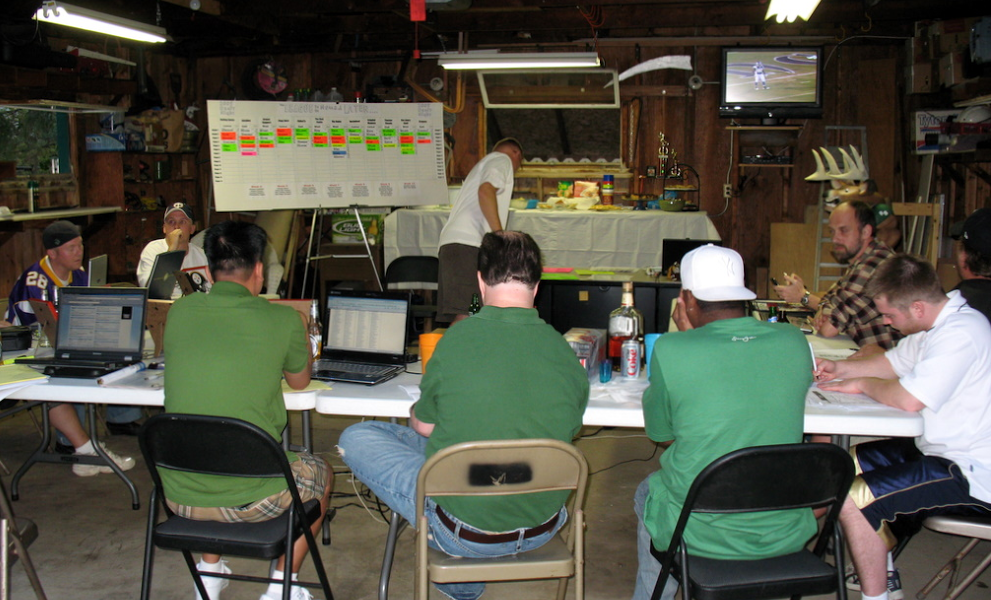Twelve people sat silently around a u-shaped table, intensely focused on the laptops and tablets in front of them that were glowing with spreadsheets and lists of names. Before them, a large paper grid covered the wall. Each block of the color-coded grid held the name and position of a football player. The people were drilling deep into each athlete’s performance statistics as they drafted players for their teams.
But this wasn’t a brain trust of major league owners. It was a get together in a bar of “regular” people who were building their fantasy football teams. One of the major online fantasy sports gambling sites guided them along the way, promising large payouts for those who choose wisely or just get “lucky.”
A harmless way to idle away a Sunday afternoon, or yet another example that anything is possible on the Internet — Including feeding an addiction?
The Fantasy Sports Trade Association claims that 33 million Americans participate in fantasy football each year. They spend more than $2.6 billion in online gambling.
Our counselors at Maryhaven frequently hear from clients who are kicking their casino habit, yet find themselves falling victim to online gambling’s addictive lure. “It’s only a click away.” “I can play it from my phone or desktop and no one else will know.”
Problem gamblers get a physical rush from the “real” experience of visiting a brick and mortar resort custom-oriented to hype the whole betting experience. But the privacy and the relative silence of online gambling can be even more alluring. After all, it’s “just fantasy.” Unfortunately, the losses and the damage are agonizingly real.
Now, these sites face significant scrutiny as legislators and regulators question their legality. The legal issue at hand: Should fantasy sports betting be considered a “game of skill” and exempt from gambling laws, or should it fall into the same category as horse racing, poker playing and other recognized gambling activities?
It has proven to be a confounding question, varying from state to state. In Ohio, the Ohio House of Representatives passed legislation in May 2017 legalizing online gambling by exempting it from Ohio’s gambling laws. Advocates argued that fantasy sports constitute a “skill-based game that requires an awful lot of research and prep work.” This sponsor even added that he personally knew how much preparation was required because when he did not do his homework, he “got slaughtered.”
But that skill-game designation has some people scratching their heads.
“By exempting fantasy contests from the gambling law, it could also suggest that a fantasy contest would be considered gambling but for the exemption,” the nonpartisan Legislative Service Commission wrote in its analysis. “If fantasy contests are not gambling, it is not clear why they need to be exempt from the gambling law.”
Regardless of the legal wrestling, make no mistake. This is big business for real. Recently, the two largest online providers, DraftKings and FanDuel, cancelled their proposed merger after the Federal Trade Commission moved to block it. In announcing the cancellation, the CEO of DraftKings said his company enjoys a growing customer base of nearly 8 million and annual revenue gains of more than 30%.
Who are the dream-team builders? A 2013 survey by SuperData Research revealed that 57% of online gamblers in the United States are female, though this includes social casino gambling that may not be for real money. Less surprising is that online gamblers tend to be young, with well over 40% ranging in age from 21-34.
But don’t mistake bettors for winners. Just one percent of players receive almost half of the winnings. And that’s after the website takes it’s cut of some 15% or more.
Even online, the odds are stacked against you. While legislators and regulators struggle to decide whether or not online gaming is gambling, the outcome is quite clear among gambling addicts who panic when they lose, feel shame and remorse, then gamble again unless they get help and begin treatment.
Fantasy gambling can be as real as it gets.

